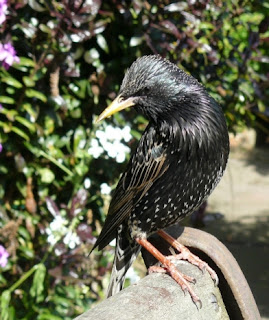Merseyside gardens vital for some of our most threatened
birds
RSPB Big Garden Birdwatch results 2013
Some of the UK s most threatened and best-loved bird
species are
continuing to decline in Merseyside, according to results
from the
RSPB s annual Big Garden Birdwatch survey 2013, released
today
[Thursday 28 March, 2013].
Starlings, a UK
red-listed species meaning it is
of the highest
conservation concern, hit an all-time low in the
Birdwatch last year
and their numbers dropped a further 19% in Merseyside
gardens this
year.
Numbers of house sparrows, also on the red-list, dropped
by 20% in
Merseyside gardens compared to 2012, whilst bullfinches
and dunnocks,
both amber-listed, fell by 43% per cent and 17%
respectively.
Martin Harper, RSPB Conservation Director, said; We know from the many
people who take part in Big Garden Birdwatch every year
that garden
birds are incredibly precious to us and connect us to nature every
day. I had the joy
of doing the Birdwatch with my children again this
year and, fidgeting aside, it was one of those memorable
mornings when
the family is captivated by nature. But, several of our familiar and
best-loved species have been declining at alarming rates
over the 34
years that the RSPB has been running the Birdwatch and
this year s
results show a continuing decline.
We go to great
lengths to ensure that special UK habitats are given
the right levels of designation and legal protection
because of their
role in supporting threatened wildlife, but what s very
clear is that
every one of our gardens, the places literally on our
doorsteps, are
important too.
Almost 590,000 people across the UK, including 75,000
pupils and
teachers at schools, took part in the Birdwatch in
January. In
Merseyside nearly 6,000 people participated in the
survey.
Whilst the decline of some species continued, others
fared better with
garden sightings of siskins and fieldfares up in
Merseyside gardens.
The cold, harsh conditions in the wider countryside back
in January is
likely to have driven more of these birds into gardens on
their search
for food.
Martin continued;
Gardens make up around 4 per cent of land area in
the UK and their role as habitats for our wildlife is
clear. They are
the places that birds come to for food and shelter when
conditions in
the countryside are especially tough and together, we can
all play a
part in making them more welcoming and supportive for
wildlife, whether
we have a garden full of greenery, a yard or a window
box.
Do something now to help the wildlife in your garden,
find out how at
Visit www.rspb.org.uk/birdwatch
and www.rspb.org.uk/schoolswatch
to
find out more about Big Garden Birdwatch.
The RSPB s Big Garden Birdwatch is the world s biggest
wildlife survey
with half a million people taking part each year. Running for 34 years
the survey has made a major contribution to tracking
garden bird
numbers over the winter www.rspb.org.uk/birdwatch
This table shows the top 10 birds seen in Merseyside
gardens in 2013.
Species
Average number per garden
1. Blackbird
2.68
2. House Sparrow
2.58
3. Starling
2.50
4. Blue Tit
2.10
5. Woodpigeon
1.90
6. Goldfinch
1.71
7. Collared Dove
1.32
8. Magpie
1.28
9.Robin
1.20
10. Feral pigeon
1.20
The RSPB speaks out for birds and wildlife, tackling the
problems that
threaten our environment. Nature is amazing - help us
keep it that way
The Royal Society for the Protection of Birds (RSPB) is a
registered
charity: England and Wales no. 207076, Scotland no.
SC037654


No comments:
Post a Comment